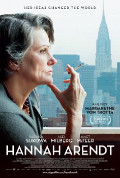
Directed by
Margarethe Von Trotta
113 minutes
Rated M
Reviewed by
Andrew Lee

Hannah Arendt
Synopsis: In the aftermath of WWII, Hannah Arendt (Barbara Sukowa), a German Jewish intellectual who escaped the Holocaust and settled in New York, travels to Israel to report on the trial of Adolf Eichmann. What she sees provokes her to write The Banality of Evil, a book which causes a storm of controversy.Biopics can be tricky things. Someone interesting enough to make a film about may not necessarily inhabit a ready-made cinematic world. You can mask this by jazzing up collateral characters and hiring gifted actors to bring them to life, or you can hope and pray that the central performance is so compelling that everything else falls by the wayside. Hannah Arendt walks something of a middle road, with a couple of warm and interesting characters filling out the world of the remarkable German-born philosopher but unfortunately the rest are cartoonish buffoons. Notably, the German-Jewish characters are mostly well-rounded, but the more obviously American ones are (with a single exception) nothing but screeching harpies. It’s a pity, because the film does quite well with its difficult material, which is, in essence, the creation of a work of moral philosophy, albeit a controversial one.
The milieu of the 1950s New York émigré intellectual is well conveyed, with dinner parties full of heated debates held in German, much to the chagrin of the few English-speaking Americans who form part of the circle. The arguments and the gentle-to-heated debate will feel familiar to anyone who has ever hosted a dinner party. There’s a reality created that builds your sense of the people and their place. Also interesting is the way the real footage of Eichmann’s trial is used in the film. It adds to sense of reality, and lets you reckon with what Arendt wrestled with: the sheer ordinariness of the man. Less successful, but no less important, are a series of flashbacks to Hannah’s time as the lover of Martin Heidegger (Klaus Pohl), a leading philosopher who ended up allying himself with the Nazi party. I don’t think it’s well handled, but Heidegger’s choices weigh on Arendt as she wrote up Eichmann’s trial.
Somewhat surprisingly given that Von Trotta is one of Germany’s leading film directors, the film looks like a telemovie, with generally bland cinematography and an uneven script that fails to get the balance of support characters right. That aside, the ideas are worth attending to, Arendt as a character is worth knowing and Sukowa’s performance is stunning.

Want more about this film?


Want something different?




